|
 |
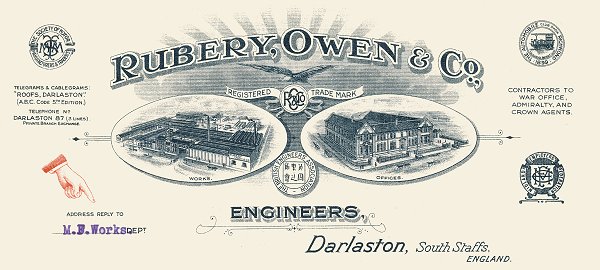
|
In the 1950s, most men in industrial
areas worked in factories. The older members of the
workforce would have started work at the age of 13, and
spent most of their life working at least a forty hour, five
day week, often plus Saturday mornings. After such a life,
retirement often came as a shock, and some people found it
difficult to adjust to a life of leisure.
The 1946 National Insurance Act
introduced a contributory state pension for all, which was
paid to men from the age of 65, and to women from the age of
60. The scheme began to operate in 1948. Although many
employers insisted that staff had to leave when reaching
retirement age, this was not the case at Rubery Owen, where
older workers were well looked after. Many chose not to
retire at retirement age, but continued doing their job as
long as they could. Some jobs required hard physical effort,
and so were unsuitable for the elderly. Wherever possible
the company found them lighter work, so that they could
continue at the factory, until old age took its toll.
Most industrial towns had a Sons of
Rest, where retired male workers could socialise, and pass
time away. Each had its own small community who met for a
cup of tea and a chat, or to play a game of cards, dominoes,
or darts, and occasionally go out on day trips to places of
interest.
Sir Alfred Owen was president of the
Sons of Rest in Darlaston and felt that it was not really
meeting the needs of the elderly. While at work, he was
presented with a list of the over 70s at the factory, and
asked what was to be done with them. There were not enough
light jobs available, and they could not cope with the high
physical demands, and the speed of operation in the
workshops.
He came up with a novel idea, a sons of
rest workshop, where members could work at a slower pace
than in the factory, carrying out light work, which would
give them a sense of purpose, and the satisfaction of a job
well done. They would also receive a small wage which would
supplement their pension.
Two wooden buildings were erected end-to-end in a corner
of the 14 acre Rubery Owen sports ground at Bentley. Each
building was 60 ft. long by 20 ft. wide. Initially the
interior consisted of a small workshop and a larger rest
room, with games, tables and armchairs. As the project
progressed, the rest room was made smaller, and the workshop
enlarged. There was a maximum of twenty two members, who
were known as ‘sons’, a foreman, and a warden. The first
foreman, Sam Checketts had originally been a superintendent
in the factory, but because of his age, had moved to a
lighter job in the tool room. The first warden, 75 years old
E. Fraser-Ryder had previously been the senior sports
organiser, before which he was a headmaster, and an
all-round sportsman. |
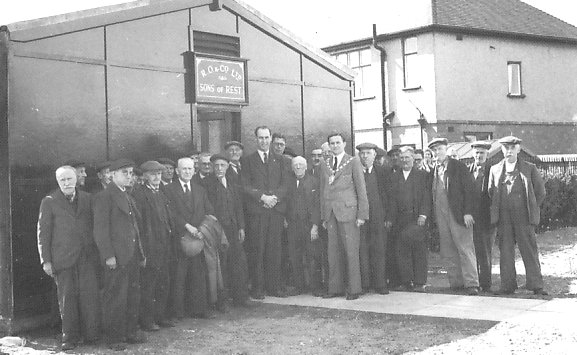
The official opening of the Sons
of Rest workshop in August, 1949. In the centre is Mr.
A. G. B. Owen, Mr. John Beddows, and Mr. Harmer
Nicholls, Chairman of Darlaston Urban District Council.
From the autumn 1949 edition of 'Goodwill' the Owen
Organisation's staff magazine. |
|
The Sons of Rest was officially opened
in August 1949 by Mr. Harmer Nicholls, the Chairman of
Darlaston Urban District Council. On Thursday 8th September
the BBC arrived with a recording van, and Leslie Cargill of
the Midland Region interviewed some of the sons. The new
establishment was expected to pay its way by obtaining
outside orders for short runs of metal objects, and by
supplying the company with much needed small and awkward
parts.
The eldest of the first group of sons
was 82 years old John Beddows who had worked for many years
in the main factory. Other members of the sons included 72
years old Bill Critch, who had worked in the structural
engineering division for forty five years, and 72 years old
Caleb Ludford, who had worked for nineteen years as a
skilled jig-maker. Then there was Elijah Bradley, also 72,
who had twenty three years service, Sam Checketts, again 72,
with seventeen years service, 71 years old Charlie
Griffiths, and Sidney Trow, and Bill Eaton, both 70. |
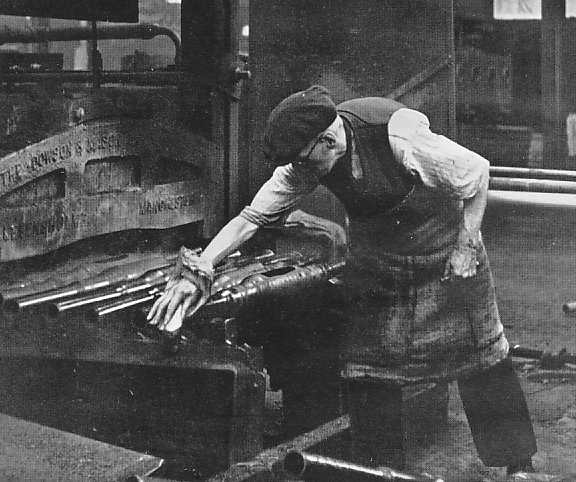 |
John Beddows at work in the
factory, doing a hard physical job that was not really
suitable for someone of advanced years.
From the Christmas 1949 edition of
'Goodwill' the Owen Organisation's staff magazine. |
| John Beddows signs in at the start
of a day at the sons workshop, full of enthusiasm, and eager
anticipation of the day ahead.
From the Christmas 1949 edition of
'Goodwill'. |
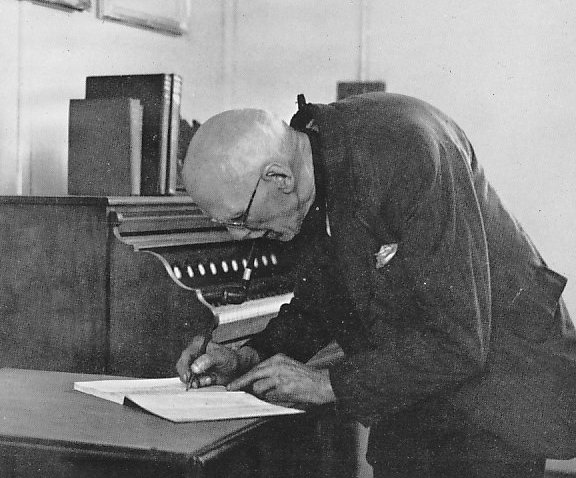 |
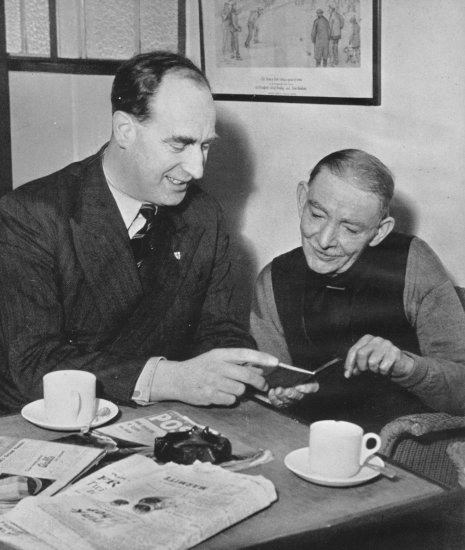 |
Mr. A. G. B. Owen chatting to
Enoch Ratcliffe in the rest room.
Enoch was an ex-works policeman. |
| A group of the sons.
Back row left to right: Jack Pursalt,
Bill Critch, Bill Cox, and Bob Tilley.
Middle row left to right: Charlie
Griffiths, Frank Dark, Harry Taylor, and John P. Rainsbury.
Front row left to right: Joe Baker,
E. Fraser-Ryder, and Sam Checketts. |
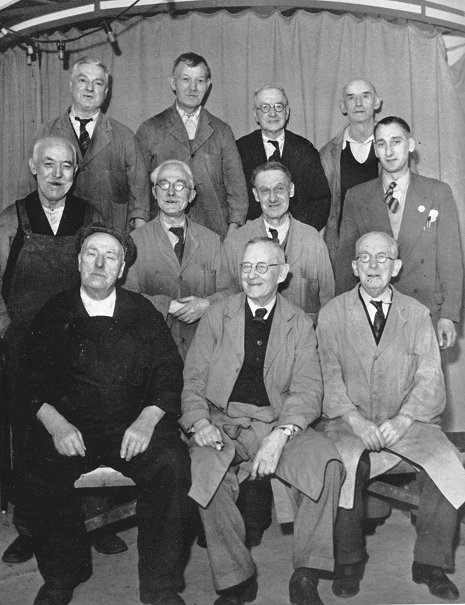 |
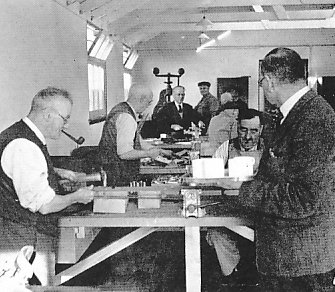
Tea time in the workshop. Twice a day
the warden, Mr. E. Fraser-Ryder came round with
refreshments. From the Christmas 1949 edition of 'Goodwill'. |
The sons were all skilled men, with vast experience and
expertise, in widely different areas of production. There
was a prevailing feeling of belonging amongst the sons. They
greatly enjoyed their time in the workshop, and were always
bubbling with enthusiasm, contentment and happiness.
Something that was rarely found in the factory.
They were extremely conscientious, and ensured that
anything produced in the workshop would be made to the
highest standards, which helped to assure the profitability
of the project.
The sons were never late, and couldn’t wait to start work
at the beginning of each day. Theirs was close-knit
community in which they eagerly undertook the most menial of
tasks. One of the sons spent most of his time in the
workshop carrying out assembly work and filing. The
remainder of his day involved scrubbing and cleaning the
floors, dusting and polishing the furniture, and cleaning
the windows. |
| One of the sons carried out precision drilling, another
was an assembler and cold riveter. Another had learned to
operate an electric sewing machine, and spent his time
producing many types of industrial protective clothing, jeep
hoods, and car seat covers. Another of the sons, the
workshop manager, produced the technical drawings, and
helped to find the outside orders that funded the project.
The sons greatly enjoyed the challenge of producing a
prototype, and ironing out any problems. |
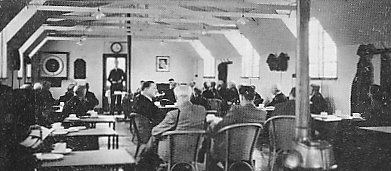
Mr. A. G. B. Owen giving his opening
address in the rest room. From the autumn 1949 edition of
'Goodwill'. |
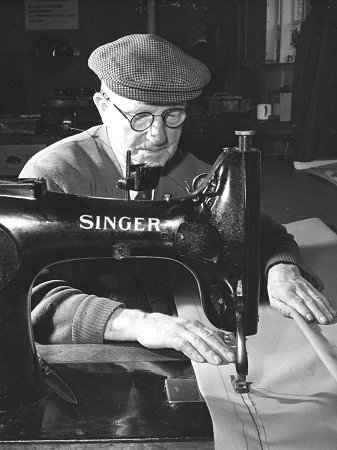 |
One of the sons hard at work on
the sewing machine. Courtesy
of Tony Highfield. |
|
Bill Cox on the sewing machine. |
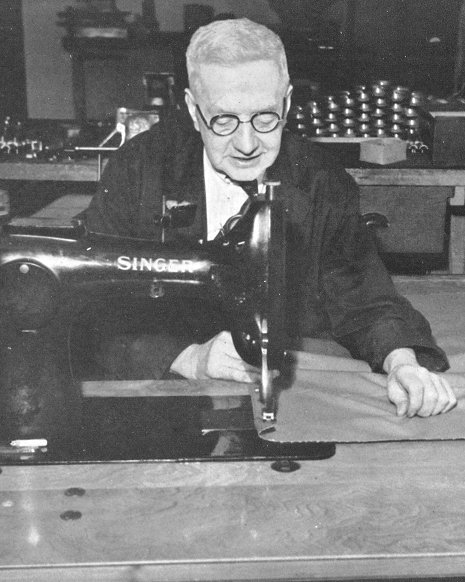 |
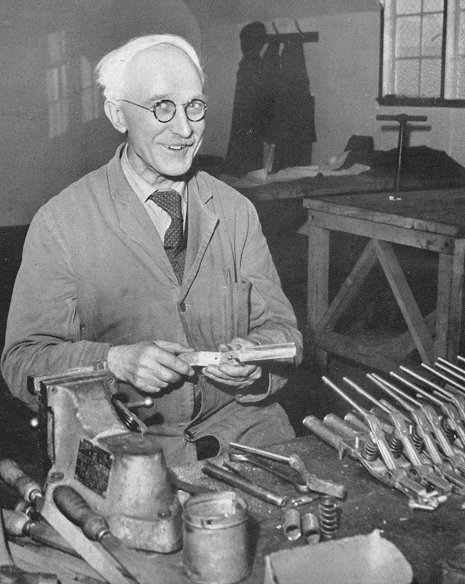 |
Frank Dark making cable clips. |
|
Lunchtime in the rest room. |
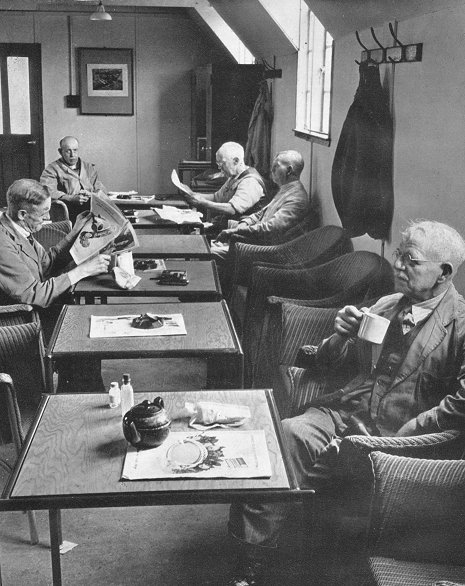 |
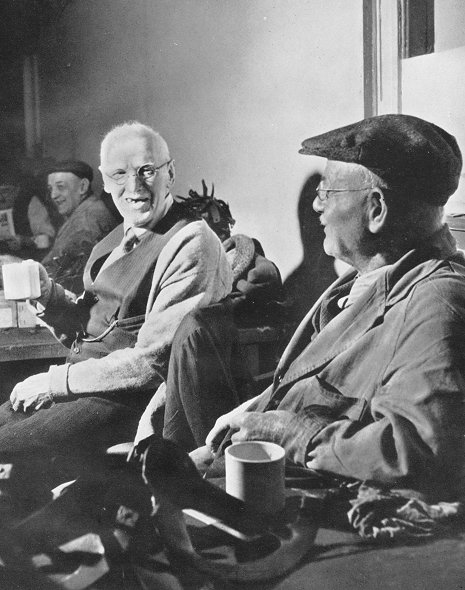 |
An enjoyable lunchtime chat. |
|
A welcome cup of tea. |
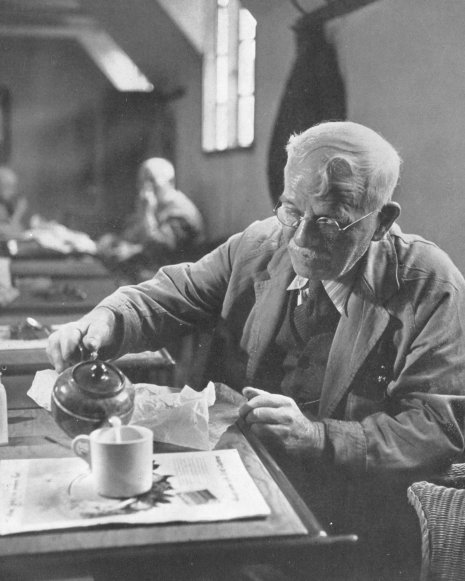 |
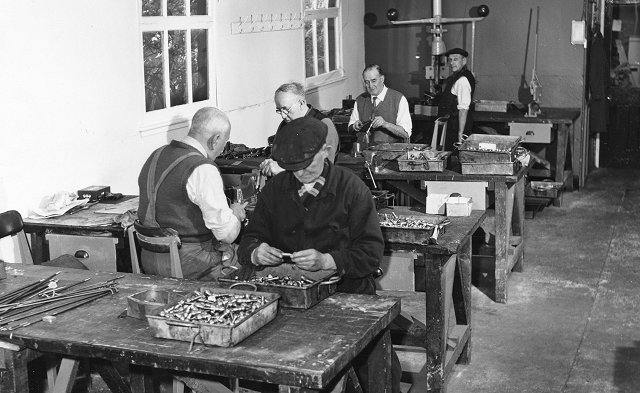
A busy day in the workshop. Courtesy of Tony
Highfield.
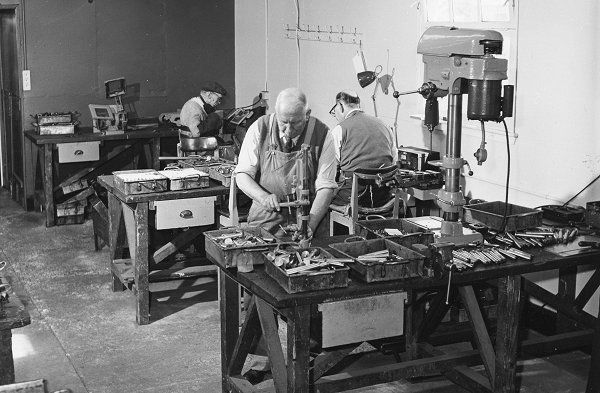 |
The other half of the workshop.
Courtesy of Tony Highfield. |
| Some of the varied
tasks that were carried out daily, from the filing of small
components to cutting timber.
Courtesy of Tony Highfield.
|
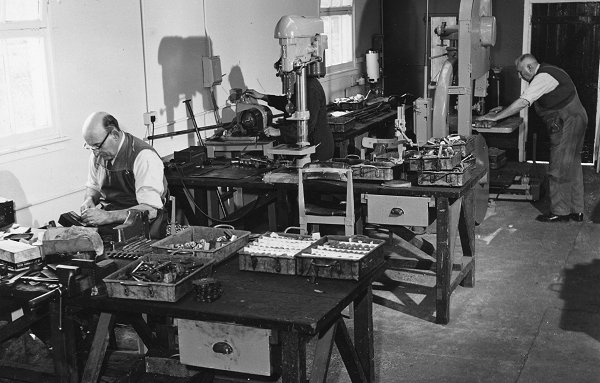 |
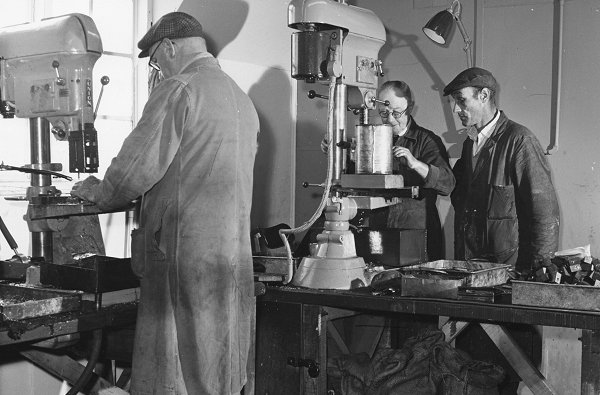 |
Two of the drilling machines in
operation. Courtesy of Tony
Highfield. |
| Filing and assembling small
components. Courtesy of Tony
Highfield. |
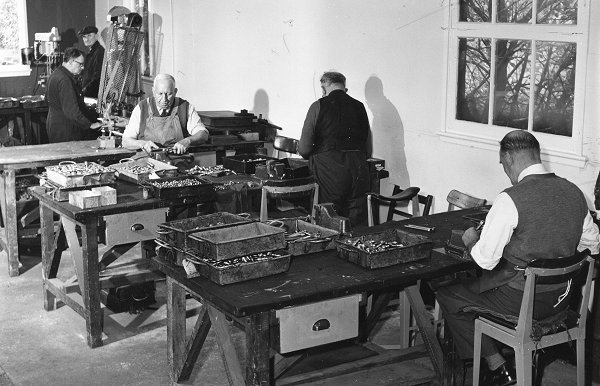 |
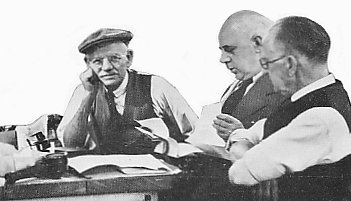
Sam Checketts (left) being interviewed
by Leslie Cargill the BBC commentator. From the autumn 1949
edition of 'Goodwill'. |
All kinds of articles were made in the workshop
including jigs, tools, and fixtures, all demanding a high
degree of skill and craftsmanship. Items were fabricated in
metal, wood, and plastic.
Products included small items such as heavy duty
electrode holders, and earth clamps. Larger items included
tubular steel hammock beds for nurseries, and two hundred
agricultural seeding units, each 8 ft. 6 inches long, and
weighing 2¾ cwts. They were built at a competitive price, on
a strict monthly delivery schedule. |
|
Carefully drilling a hole. |
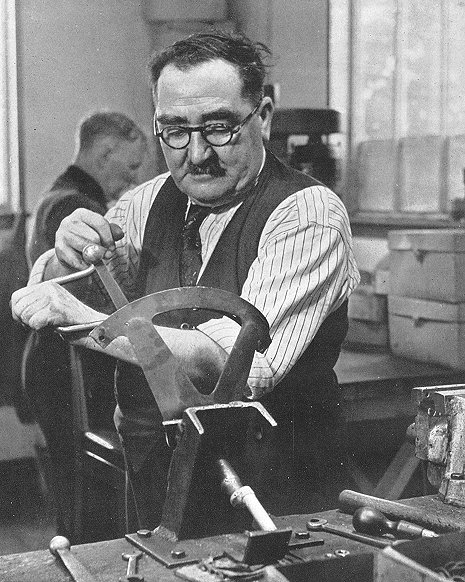 |
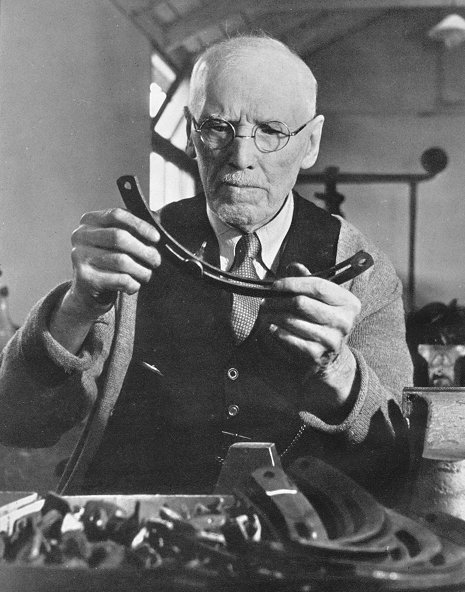 |
John Beddows inspects a newly-made
component. |
| The sons’ lunch break began at 12 o’clock. They would
settle down to a sandwich and a cup of tea, followed by
reading a newspaper, a game of darts, or cards, or maybe a
snooze. There was often little conversation.
At 12.55 p.m. they would promptly finish what they were
doing in order to return to their bench or machine by 1
o’clock sharp. |
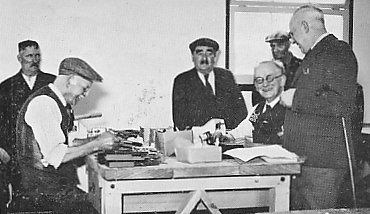
Leslie Cargill interviewing some of
the sons in the workshop. From
the autumn 1949 edition of 'Goodwill'. |
|
The sons’ social activities were
limited to a day’s outing in the summer, and a lunch and tea
at Christmas. It was paid-for from the profits of the rest
room, a donation from the three managing directors, and a
weekly subscription, to which each son contributed. The rest
room profits came from the daily two cups of tea, costing
one penny each, which were prepared and served by the
warden.
Sir Alfred Owen was a deeply religious
man. Every Good Friday, the sons were expected to join him
at a morning service. They rarely saw the managing directors
at other times, other than the Christmas tea party, which
they always attended. |
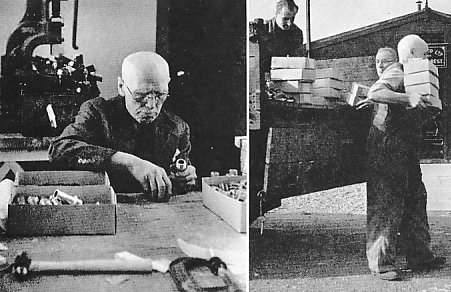
John Beddows at work in the workshop,
and carrying boxes containing components from the main
factory, that had to be finished off. From the Christmas
1949 edition of 'Goodwill'. |
They had a steady stream of visitors,
who inspected the sons’ daily routine with interest.
Initially the scheme attracted a lot of publicity and so
callers arrived from various newspapers and publications.
When this activity died down, representatives from other
manufacturing companies, from much of the world, came to
evaluate the scheme, and consider the possibility of
setting-up their own sons of rest workshop.
Visitors were always well looked after,
and numerous names appeared in the visitors’ book. A regular
visitor was the group chaplain. He used to sit in the quiet
rest room to answer his correspondence. |
|
Bob Tilley at work. |
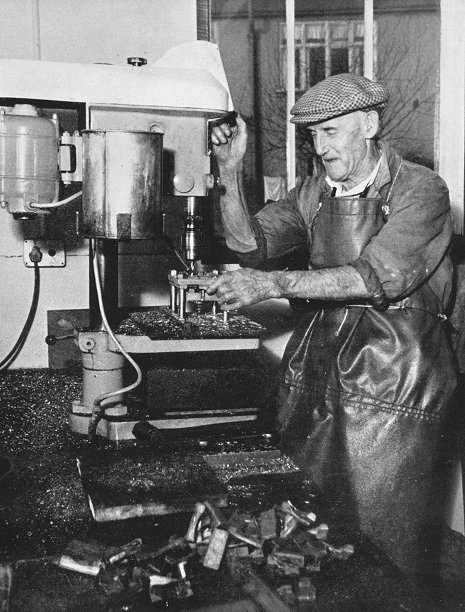 |
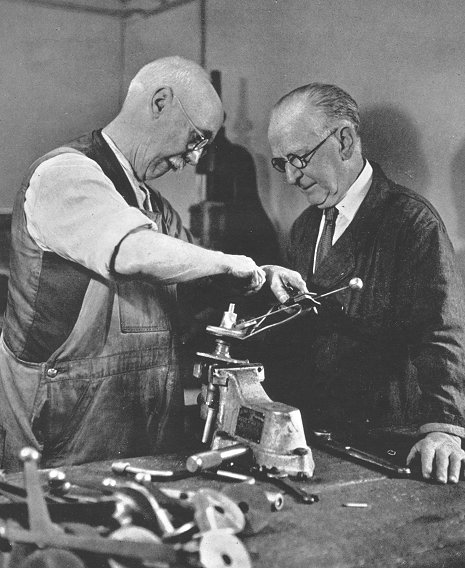 |
Charlie Griffiths and Sam
Checketts. |
| The sons of rest workshop was a great success. It added
a sense of purpose to the lives of the sons, and kept them
active in both mind and body.
It equally served the factory well, providing small
components that were essential, but difficult to make. |
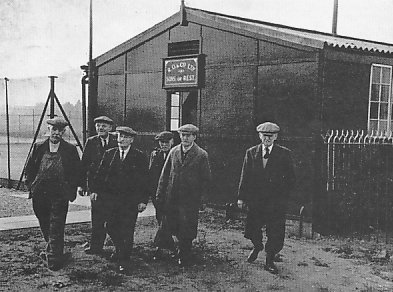
Home time, after a rewarding day. From
the Christmas 1949 edition of 'Goodwill'. |
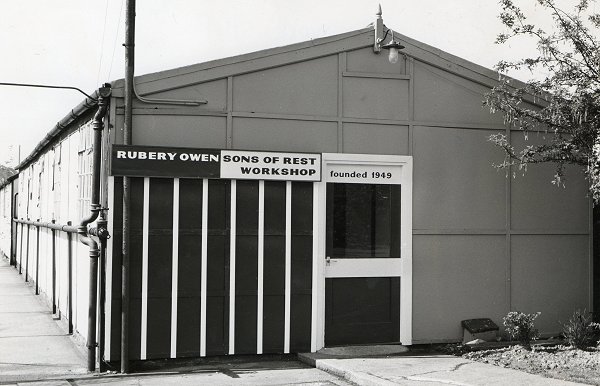 |
A later view of the workshop.
Courtesy of Tony Highfield. |
 |
|
 |
|
 |
Return to The
Later Years |
|
Return to the contents |
|
Proceed to
Sports & Leisure |
|